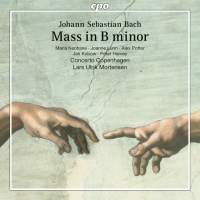Texte paru dans: / Appeared in: |
|
|
Outil de traduction ~ (Très approximatif) |
|
|
Reviewer: George
Chien Lars Ulrik Mortensen’s subscribes to Joshua Rifkin’s conviction that Bach meant to have his choral music sung by soloists. Readers will know that I remain a skeptic, which inevitably affects my response to this recording, and probably will influence yours as well. I immediately missed the choral ambience in the opening Kyrie and did so elsewhere in the performance. The B-Minor Mass was not an occasional task; it was a summation of Bach’s life’s work. It was grandly conceived, and it’s not unthinkable that Bach might have wanted it grandly realized. But we’ll never know. That said, Mortensen’s minimalist inclination can not be a game breaker. An increasing number of conductors have bought into Rifkin’s theory, and it’s not going to go away. There have been worthy one-to-a-part realizations of the Mass. Rifkin’s groundbreaking recording comes to mind, as does John Butt’s more recent effort. My first impression on listening to Mortensen’s version, apart from the above, was that this guy’s in a hurry. We know from Carl Philippe Emanuel that Bach liked quick tempos. That’s the current preference, too. We can’t imagine returning to the pace that prevailed a century ago. But what’s appropriate for concertos and toccatas is less so for music of contemplation and reflection. So parts of Mortensen’s Mass—the Kyrie, for example—seem too rushed. The Cum Sancto Spiritu feels like a race to the finish line. Fortunately the result is a draw—everyone hits the mark at the same time—but it is breath-taking, and not necessarily in the best way. Tempos seem a bit more relaxed, though, in the Sanctus and entirely appropriate in the Dona nobis pacem. Another distraction is Mortensen’s apparent fondness for détaché—a bit too much for my taste—and I could do with not quite so much vibratoless singing. But the solo quintet is strong, the instrumentalists are expert, and Mortensen’s commitment is evident. Overall, the plusses for me outweigh the minuses. It’s an OK version of the B-Minor Mass, but not an indispensable one. My default B-Minor Mass remains John Eliot Gardiner’s (with chamber chorus) on Archiv. For a minimalist version, I’d go with the aforementioned Rifkin or Butt. | |
|
|
|
|
Cliquez l'un ou l'autre
bouton pour découvrir bien d'autres critiques de CD |
|




